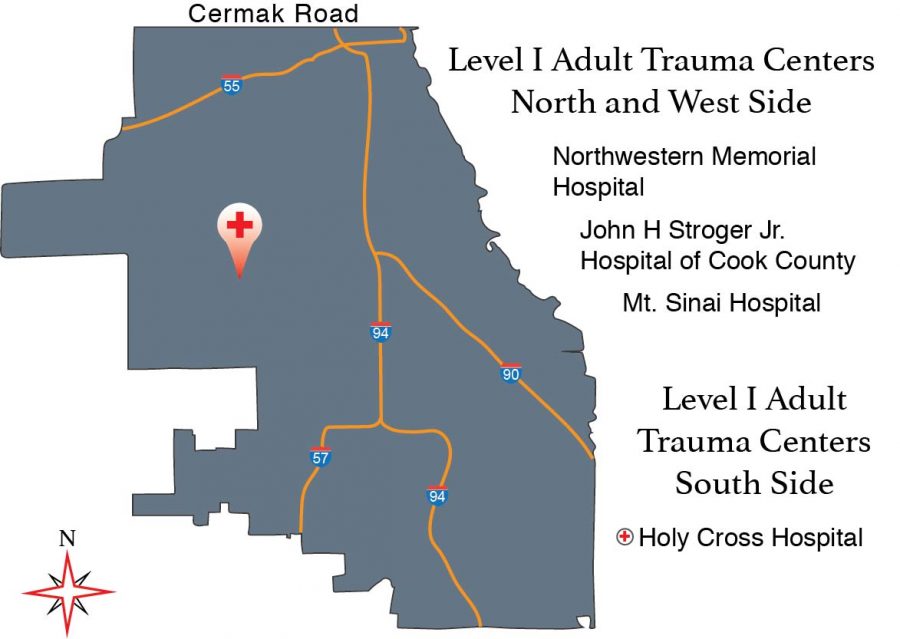Chicago’s South Side to get first trauma center since 1991
September 21, 2015
Often referred to as a “trauma desert,” Chicago’s South Side will soon be home again to an adult trauma center, but activists who have fought more than five years for one are still unsatisfied.
Through a partnership between University of Chicago Medicine and Sinai Health System, Holy Cross Hospital’s emergency room, located at West 68th Street and South California Avenue, will be transformed into a Level 1 adult trauma center. According to a Sept. 10 press release from the University of Chicago, the center, which will cost $40 million, has the support of Mayor Rahm Emanuel.
“This new Level 1 adult trauma center is a true community and civic effort, and the City of Chicago looks forward to working with key stakeholders to bring this to fruition,” Emanuel said in the press release. Trauma centers focus on treating injuries caused by gunshots, car accidents, stabbings and other serious medical emergencies.
The American Journal of Public Health has described the South Side as a “trauma desert” on its website. The AJPH looked at gunshot wound data from 1999–2009 and found shooting victims more than five miles from a trauma center have an increased fatality rate.
According to Daniel Kaplan, a community organizer at the Jewish Council on Urban Affairs, some neighborhoods on the South Side will still be left out of the five-mile radius. These neighborhoods include Woodlawn, Kenwood, and parts of South Shore and Bronzeville. Some activists believe that the University of Chicago Hospital, which is helping finance the center according to the press release, needs to offer this level of care on its Hyde Park premises.
“We are excited to hear about it and think it’s a victory for the South Side, but we also recognize that there are a lot of problems with it and that it doesn’t change the underlying nature of the University of Chicago,” said Natalie Naculich, a University of Chicago student and member of Students for Health Equity, which has campaigned for a trauma center at the university for five years.
Kaplan expressed similar views.
“It’s not enough to have one location on the South Side, the South Side is massive,” he said.
The University of Chicago had a level 1 adult trauma center until it closed down in 1991 due to financial reasons.
Kristen Ambrose, the sister of Kevin Ambrose, a Columbia student who was shot to death in 2013, said her brother’s death highlights the need for a trauma center on the South Side. Kevin Ambrose was shot near the 47th Street Green Line stop, 314 E. 47th St., and was transported to Stroger Hospital in the 1900 block of W. Ogden more than 20 minutes away. Some believe Kevin Ambrose might have been saved if an adult trauma center had been available at the University of Chicago Hospital but his sister declined to speculate.
“If there were a trauma center on the South Side, I don’t know if Kevin would still be alive or not, and I don’t want to blame University of Chicago or anybody else but the shooter for Kevin’s death, because he didn’t deserve that,” Kristen Ambrose said.
However, she is dismayed that the new center will not be located at the University of Chicago. Kristen Ambrose has worked with the Kenwood Oakland Community Organization—which helps low-income residents on the South Side—to advocate for a trauma center to be built at University of Chicago .
Ambrose, and other community activists are upset that the new trauma center is not at the location they have been protesting for. “It’s a slap in the face,”
Ambrose said.
Illinois Congressman Bobby L. Rush (D-Ill.) has been a long-time supporter and advocate for construction of a Level 1 adult trauma center on the South Side. In 2013, Rush helped pass the Trauma Act, which issued $100 million to Illinois and other states to build Level 1 trauma centers.
“This issue has always been a great concern of mine,” Rush said in a Sept. 11 press release.“That is why, in 2013, I introduced HR 2660 – Trauma Relief Access for Universal Medical Assistance Act. This bill requested the Department of Health and Human Services allot $100 million for the program of grants to states to promote universal access to trauma care services provided by trauma centers and trauma-related physician specialties.”
Protest organizations say they will continue to work for the results they want to see from the University of Chicago.
“By sending money to another hospital, they’re sending trauma patients to another hospital,” Naculich said.








